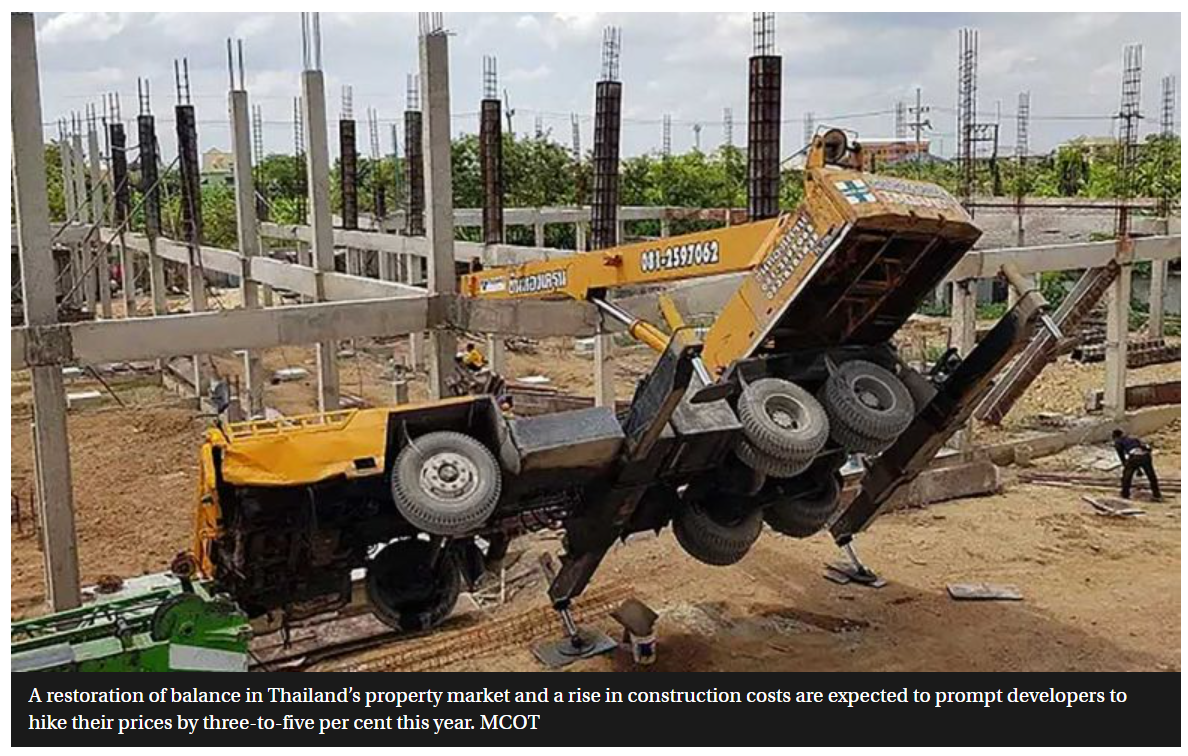Property prices in Thailand expected to jump up 3-5%
Thai property developers expect to hike their prices by three-to-five per cent this year due to rising construction costs and a restoration of balance in the property market.
Richy Place CEO Apa Ataboonwongse on January 14 said now that some of the properties in stock since 2020 have moved, developers will need to adjust their prices to reflect the cost of construction, which has been rising since last year.
“In 2022, we expect to see property prices go up by three-to-five per cent,” she said. “Developers cannot maintain the same prices despite management cost having reduced over the past year.
“Also, due to Covid-19, most migrant workers have returned to their countries, causing labour shortage. This, in turn, has spiked the manpower cost and delayed most projects by 10 to 20 per cent from their previous schedules,” Apa added.
Uthai Uthaisangsuk, chief operating officer at property developer Sansiri, said that currently demand and supply in the property market are in a balanced position.
“Sansiri has less than 10 billion baht [$301 million] worth of unsold condominiums and some two billion baht worth of unsold houses, which means there is no need for developers to engage in price wars to get rid of stock.
“Instead, this year we will focus on improving after-sales service and improve the quality of the product to attract more customers,” he said.
Meanwhile, Wichai Wiratkaphan, acting director of Government Housing Bank’s Real Estate Information Centre, said the centre estimates that property prices in 2022 will surge due to an increase in the cost of construction materials, though the price of land will likely stay the same.
“This year we also expect to see developers rolling out fewer discounts and promotional campaigns as the demand in the property sector is starting to rise and is matching the supply,” he said.
On the other hand, property transfer and mortgage fees will remain at 0.01 per cent until the end of 2022 for properties costing no more than three million baht.
The government had lowered transfer fees from two per cent to 0.01 per cent and mortgage fees from one per cent to 0.01 per cent in 2019 in a bid to support the real-estate sector. The subsidy was to be offered until December 31, 2021.
“The Cabinet earlier this month agreed to extend the campaign until December 31, 2022, as part of the government’s economic stimulus plan,” Department of Lands director-general Nisit Chansomwong said on January 18.
The subsidy covers houses, condominiums or land with an estimated value of no more than three million baht. The subsidy applies to both new and second-hand property, but can only be used by Thai nationals.
“The department believes this campaign will help Thais get their own property more easily and will also promote the property sector as well as other related industries that have been suffering from the fallout of Covid-19,” Nisit said.
And finance minister Arkhom Termpittayapaisith on January 17 ruled out any reduction this year in the land and buildings tax, as relief had already been granted for two years and any further cuts would be a fiscal burden for the government.
He said that a 90 per cent reduction in land and buildings taxes granted in 2020 and 2021 had cost the government about 30 billion baht a year in lost revenue, which is a high burden.
The finance ministry has suggested that there be no further tax cuts and the legal rate be restored this year, he said.
The land and buildings tax is collected by the local government organisation. The amount is treated as local revenue, which is reinvested in developing that locality.
When the government announced a 90 per cent reduction in the land and buildings tax in June 2020, the ministry had to find money to compensate local governments for lost revenue.
Previously, the government had postponed the deadline for residents of land and buildings to pay this tax from April to August. The usual tax will now be paid in April, starting 2023.
THE NATION (THAILAND)/ASIA NEWS NETWORK


 English
English




